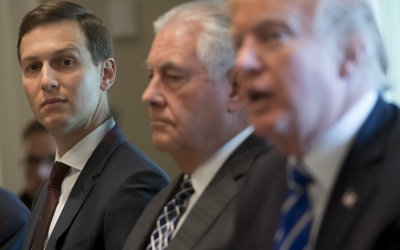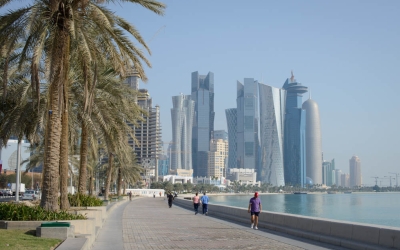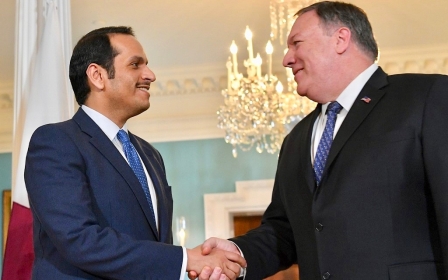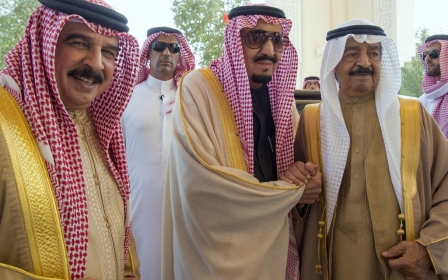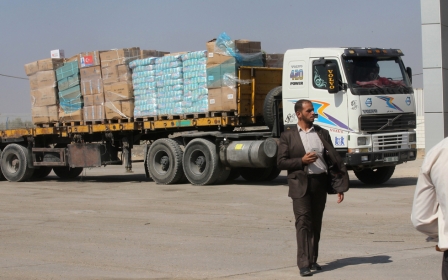Trump meeting with Qatar emir may boost trade ties, sidestep Gulf tensions
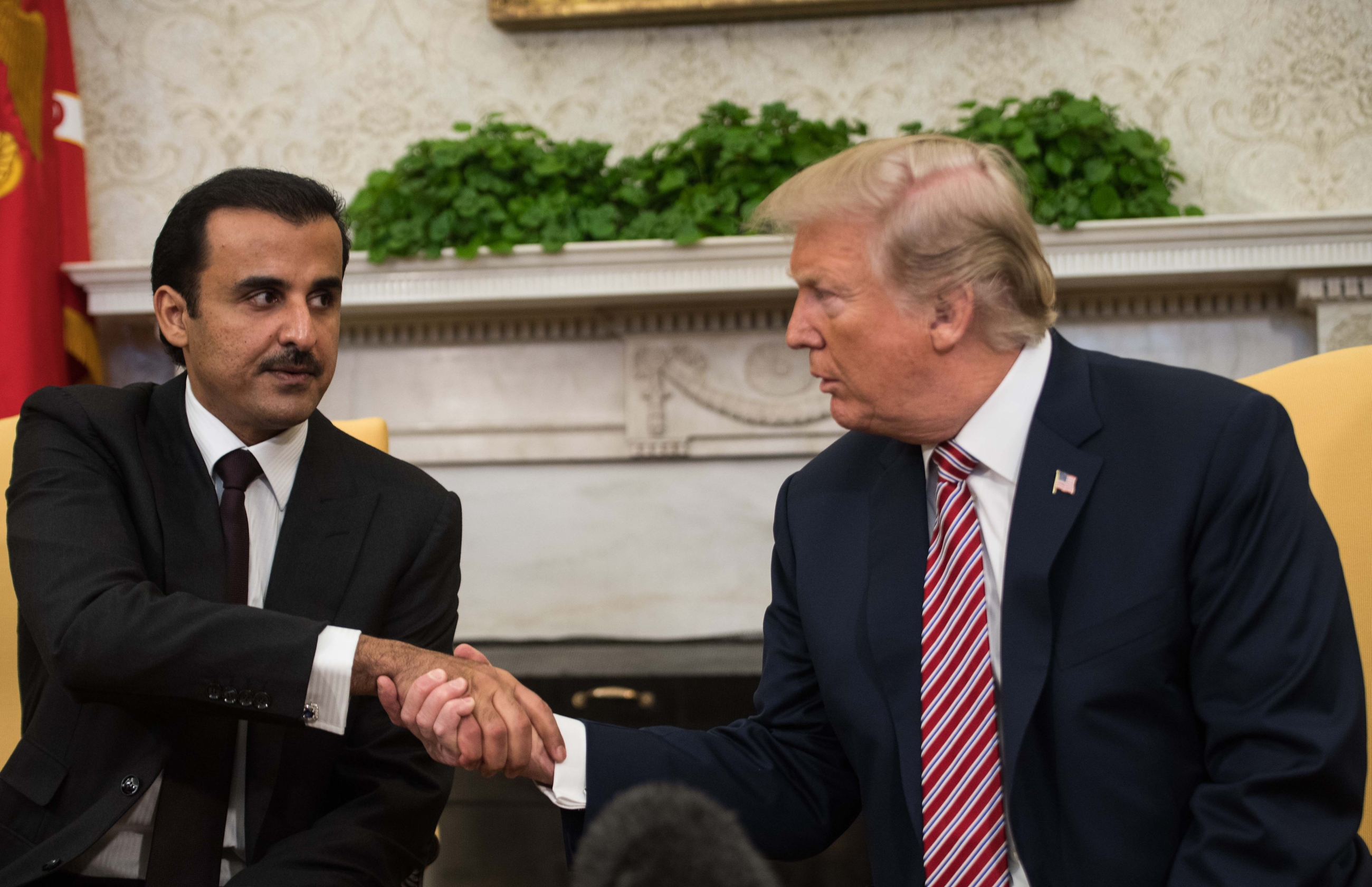
Despite soaring political tensions in the Gulf and a blockade of Qatar that continues to pit one-time allies against each other, the Qatari emir's visit to Washington this week is expected to be nothing more than a blip on the radar.
In fact, more than two years into a diplomatic feud, it is clear that President Donald Trump's administration has no intention to push for an immediate resolution to the crisis, experts say.
"Working with Qatar to solve the crises in the Gulf is not something Trump is interested in," said Birol Baskan, a non-resident scholar at the Middle East Institute, a think-tank in the US capital.
Sheikh Tamim bin Hamad Al Thani is set to arrive in the United States on 9 July to discuss regional politics, security, and counterterrorism cooperation with the US president, the State Department said last month.
The meeting is the latest public display of cooperation between the two allies, and it may culminate in fresh weapons deals for the small Gulf country, Baskan told Middle East Eye in an interview.
New MEE newsletter: Jerusalem Dispatch
Sign up to get the latest insights and analysis on Israel-Palestine, alongside Turkey Unpacked and other MEE newsletters
"It is much more likely that the US is going to sell Al Thani more American weapons during his visit, and Qatar will buy those weapons to keep the United States happy," he said.
Still, the meeting comes at a critical time for the US, as Trump seeks to build support for his administration's "maximum pressure" campaign against Iran.
Thus far, the US government has shied away from pushing Qatar to take up its hard-line stance.
It has also cautiously watched as the tiny Gulf peninsula, home to one of the world's largest US military bases, struggles under a blockade imposed in 2017 by other American allies in the region.
Saudi Arabia, in lockstep with the United Arab Emirates, Bahrain and Egypt, justified the blockade by accusing Qatar of supporting terrorist groups - a charge the Qatari leadership has vehemently denied.
Still, despite the ongoing rift, Al Thani has been able to cushion the impact of the diplomatic crisis by finding new economic partners, building up domestic industries, buying weapons and increasing trade, particularly with the US.
In May, Qatar inked a $3bn deal to purchase a slew of US weapons, including 24 Boeing AH-64E Apache attack helicopters.
And at the start of the year, the Qatar Investment Authority (QIA) announced plans to increase its US investments from $30bn to $45bn over the next two years.
That bodes well for Trump, who has made securing favourable business deals - and weapons contracts, in particular - a key element of his Middle East policy.
"We have a gentleman, on my right, who buys a lot of equipment from us. A lot of purchases in the United States, and a lot of military airplanes, missiles - lots of different things," Trump said of Al Thani, during the Qatari emir's last visit to the White House on 10 April 2018.
"They've been great friends in so many ways. We're working very well together, and I think it's working out extremely well."
Ties were tested
Still, US-Qatar ties were tested in the early days of the blockade, as senior Trump administration officials echoed their allies in Saudi Arabia by accusing Doha of supporting terrorism.
On 6 June 2017, a day after the blockade was announced, Trump implied on Twitter that Qatar was funding "radical ideology".
But the following month, the US took a more neutral stance, with then secretary of state Rex Tillerson arriving in Qatar to sign an agreement for sharing information on terrorism and terrorist financing.
To the dismay of the quartet imposing the blockade, that deal made no demands on Qatar to cut ties with the Muslim Brotherhood or Iran.
Over the course of the first year of the blockade, Qatar launched a charm offensive to gain US favour, spending millions of dollars on lobbyists in Washington - including Brian Ballard, a top Trump fundraiser - and flying influential American power brokers to Doha.
The Trump administration has repeatedly said it's in its best interests to get the Gulf countries to reconcile.
Then, during a trip to Doha in January, Secretary of State Mike Pompeo said the diplomatic crisis had "dragged on too long".
But beyond those statements, Washington has done little to force its allies to end the stalemate, and the leaders in Doha, Abu Dhabi, Riyadh, Manama and Cairo have also failed to make any serious efforts in that regard.
US military base
Qatar's geographic location - directly positioned between powerhouse rivals Saudi Arabia and Iran - makes it a critical ally for Washington as it pursues its interests in the region.
Qatar is also the location of the headquarters of the US Central Command (CENTCOM), one of the US's biggest foreign military bases, which oversees the Pentagon's operations in the Middle East.
'Working with Qatar to solve the crises in the Gulf is not something Trump is interested in'
- Birol Baskan, Middle East Institute
Already home to about 10,000 US troops, earlier this year Pompeo signed an agreement with Doha to expand the facility.
The base is one of the reasons Saudi-led hostilities against the country have not escalated very far beyond the blockade, Baskan said.
And even as tensions between Iran and the US become increasingly volatile, Qatar has maintained relative neutrality.
"They are great diplomats," Baskan said.
"They have very strong allies, including Turkey and Iran, while at the same time keeping up a strong relationship with the United States and surviving through the blockade. They have managed these relationships under serious constraints and they have done it well."
'No clear strategy'
Recent US-Iran tensions may have presented an opportunity to close the gap between Doha and Riyadh, however, as Saudi Arabia invited Qatar to attend three emergency summits in Mecca in May to discuss the situation.
Qatar's prime minister attended the conference, but in the end, the country spoke out over the summit participants' hard-line position on Iran.
The leaders assembled in Saudi Arabia had "adopted Washington's policy towards Iran" without taking "the neighbourhood into consideration", Al Thani told Qatari news network Al Jazeera at the time.
Still, despite Qatar's tepid criticism of Washington's "maximum pressure" strategy against Iran, the Trump administration has not publicly objected as Doha cautiously navigates the politics of the Gulf.
A key obstacle to resolving the crisis lies in the fact that the parties aren't losing much as the blockade continues, says Majed al-Ansari, a senior research assistant at Qatar University's Social and Economic Survey Research Institute.
Ending the blockade without getting major concessions from Qatar would make Saudi Arabia and its allies look weak, but Qatar has manoeuvred through the blockade relatively unscathed, and has little reason to offer concessions.
'[The US] has no clear strategy toward the Gulf except for the president's insistence on blackmailing Gulf states into buying more American weapons'
- Majed al-Ansari
And while Trump would like to "exploit a potential success" by being the player to bring the two sides together, he is unwilling to call for mediation without a clear path to victory, al-Ansari wrote in a recent policy paper for the Arab Center DC.
"The general atmosphere is not ready for a comprehensive dialogue under American direction," he wrote.
"[The US] has no clear strategy towards the Gulf except for the president's insistence on blackmailing Gulf states into buying more American weapons to help the American job market."
As a result, "the most likely scenario is a continuation of the status quo, since no party to the dispute feels desperate enough to change it", al-Ansari concluded.
Still, ongoing tensions between the US and Iran have the potential to shake up that status quo.
"If there were [US] military confrontations [with Iran], then Qatar would be forced to make up its mind," said Jean-Francois Seznec, a professor at the School of Advanced International Studies (SAIS) at Johns Hopkins University who specialises in business and finance in the Middle East.
"Really, it would have no choice but to abide by US wishes," Seznec told MEE, "but at this point we aren't there."
He added that Qatar has long been "pretty comfortable playing both sides of the fence".
In the meantime, strong US-Qatar ties appear poised to continue.
Speaking earlier this month about the forthcoming meeting between Trump and Al Thani, William Grant, chief of mission and charge d'affaires at the US embassy in Qatar, was optimistic.
He said the relationship between the two countries had "reached historic heights".
"Qatar has been a great friend and ally to the US in many ways," Grant said, "and great things will be happening in the relationship."
Middle East Eye delivers independent and unrivalled coverage and analysis of the Middle East, North Africa and beyond. To learn more about republishing this content and the associated fees, please fill out this form. More about MEE can be found here.


